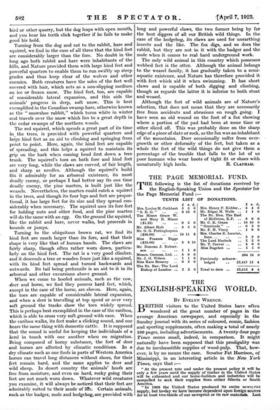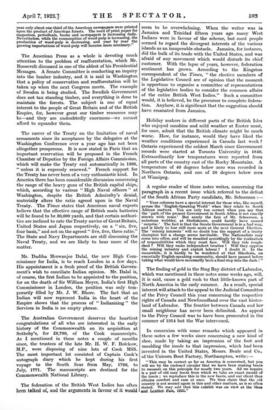THE
ENGLISH-SPEAKING WORLD.
BY EVELYN WTI:FINCH.
BRITISH visitors to the United States have often wondered at -the great number of pages in the average American newspaper, and especially in the Sunday journal with its series of coloured, comic, fashion and sporting supplements, often making a total of nearly 100 pages, including advertisements. A twenty-four page Times seems small, indeed, in comparison. It might naturally have been supposed that this prodigality was due to inexhaustible supplies of wood-pulp. That, how- ever, is by no means the ease. Senator Pat Harrison, of Mississippi, in an interesting article in the New York Times, says that :— "At the present rate and under the present policy it will be only a few years until the supply of timber in the United State's will be exhausted and our home-builders and industries will be compelled to seek their supplies from -either -Siberia or South America.
"In 1909 the United States produced its entire newsprint supply, but to-day we have become dependent upon foreign sources for at least two-thirds of our newsprint or its raw materials. Last
year only about one-third of the American newspapers vrere printed upon the product of American forests. The need of print paper for magazines, periodicals, books and_ newspapers is increasing daily. Nevertheless, while the consumption of wood-pulp is increasing, the production of wood-pulp is decreasing, and year by year the growing importations of wood-pulp will become more necessary."
The American Press as a whole is devoting much attention to the problem of reafforestation, which Mr. Roosevelt discussed in one of the ablest of his Presidential Messages. A Senate Committee is conducting-an inquiry into the lumber industry, and it is said in Washington that a policy of conservation and reafforestation will be taken up when the next Congress meets. The example of Sweden is being studied. The Swedish Government does not tax standing timber, and everything is done to maintain the forests. The subject is one of equal interest to the people of Great Britain and of the British Empire, for, however great our timber resources may be—and they are undoubtedly enormous—we cannot afford to squander them.
The career of the Treaty on the limitation of naval armaments since its acceptance by the delegates at the Washington Conference over a year ago has not been altogether prosperous. It is now stated in Paris that an important reservation will be proposed in the French Chamber of Deputies by the Foreign Affairs Commission, which will make the Treaty end automatically in 1936, "unless it is expressly renewed." French support for the Treaty has never been of a very enthusiastic kind. In America there has been considerable discussion concerning the range of the heavy guns of the British capital ships, which, according to various "High Naval officers" at Washington, despite the British Admiralty's denial, materially alters the ratio agreed upon in the Naval Treaty. The Times states that American naval experts believe that the effective range of British main batteries will be found to be 30,000 yards, and that certain authori- ties are inclined to rate the Treaty navies of Great Britain, United States and Japan respectively, on a "six, five, four basis," and not on the agreed" five, five, three ratio." The State and Navy Departments are still discussing the Naval Treaty, and we are likely to hear more of the matter.
Mr. Dadiba Merwanjee Dalai, the new High Com- missioner for India, is to reach London in a few days. His appointment is a fresh proof of the British Govern- ment's wish to conciliate Indian opinion. Mr. Dalal is, of course, the first Indian to be appointed to the position, for on the death of Sir William Meyer, India's first High Commissioner in London, the position, was only tem- porarily filled by Mr. J. W. Bhore. The fact that an Indian will now represent India in the heart of the Empire shows that the process of " Indianizing " the Services in India is no empty phrase.
The Australian Government deserves the heartiest congratulations of all who are interested in the early history of the Commonwealth on its acquisition at Sotheby's, for £6,780, of the Cook manuscripts. As I mentioned in these notes a couple of months since, the trustees of the late Mr. IL W. F. Bolckow, M.P., were disposing of nine lots of Cook MSS. The most important lot consisted of Captain Cook's autograph diary which he kept during his first voyage to the South Seas from May, 1768, to July; 1771. The manuscripts are destined for the Commonwealth National Library.
The federation of the British West Indies has often been talked of, and the arguments in favour of it would seem to be overwhelming. When the writer was in Jamaica and Trinidad fifteen years ago many West Indians were in favour of the scheme, but most people seemed to regard the divergent interests of the various islands as an insuperable obstacle. Jamaica, for instance, did the bulk of its trade with the United States, and was afraid of any movement which would disturb its chief. customer. With the lapse of years, however, federation sentiment has grown. According to the Kingston correspondent of the Times, "the elective members of the Legislative Council are of opinion that the moment is opportune to organize a committee of representatives of the legislative bodies to consider the common affairs- of the entire British West Indies." Such a committee would, it is believed, be the precursor to complete federa- tion. Anyhow, it is significant that the suggestion should have emanated from Jamaica.
Holiday makers in different parts of the British Isles who enjoyed sunshine and mild weather at Easter must, for once, admit that the British climate might be much worse. How, for instance, would they have liked the weather conditions experienced in Canada last week ? Ontario experienced the coldest March since Government records were started at Toronto University in 1840. Extraordinarily low temperatures were reported from all parts of the country east of the Rocky Mountains. A temperature of 40 degrees below zero was recorded in Northern Ontario, and one of 20 degrees below zero at Winnipeg.
A regular reader of these notes writes, concerning the paragraph in a recent issue which referred to the defeat of the South African Party candidate, Mr. Schoeman :— " Your columns have a special interest for those who, like myself, peruse the English-Speaking World' when they relate to South African matters. You are only too correct when you say that the path of the present Government in South Africa is not exactly strewn with roses.' But surely the fate of Mr. Schoeman, a notorious wobbler, at Oudtshoorn, could hardly have caused surprise.' The fact is that the Smuts .Government is in a had way, and is likely to lose still more seats at the next General Election. The mining interests' will no doubt lose the support of a trusty champion but a change seems inevitable. The Nationalists may come into office, and will be steadied accordingly by the realization of responsibilities which they must face. Will they ride rough. shod Will they make- independent treaties 7 Will they oppress the mining industry and exploit labour ? I doubt it. In the meanwhile, it is hardly to be wondered at that Rhodesia, an essentially English-speaking community, should have paused before taking what would have necessarily been a final step into the dark t" The finding of gold in the Stag Bay district of Labrador, which was mentioned in these notes some weeks ago, will, it is said, cause a gold rush to that little-known part of North America in the early summer. As a result, special interest will attach to the appeal to the Judicial Committee of the Privy Council this year concerning the respective rights- of Canada and Newfoundland over the vast hinter- land of Labrador. The frontier between Canada and her small neighbour has never been delimited. An appeal to the Privy Council was to have been prosecuted in the summer of 1914 but the War intervened.
In connexion with some remarks which appeared in these notes a few weeks since concerning a new kind of shoe, made by Wring an impression of the foot and moulding the insole to that impression, which had been _ invented in the United States, Messrs. Beale and Co., of the Unicorn Boot Factory, Northampton, write :— " This may be correct as far as America is concerned, but you will see by the enclosed circular that we have been making boots to measure on this principle for nearly two years. All we require is a pair of old easy boots from which we take an exact mould of the insole; we reproduce this in the new boots, and our client thus obtains comfort and ease at once. We thus claim that the old country is not second again in this and other matters, as is so often stated. We may add that this exhibit was on view at the Shoe and lx.ather. lair,- 1021."











































 Previous page
Previous page